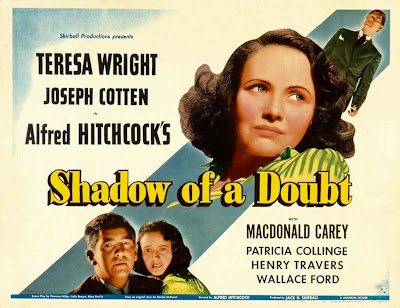
Shadow Of A Doubt (1943)
I was keen to see this particular film from Hitchcock because of all the connections made to the recent Chan-Wook Park movie "Stoker". I can see the connection, but "Stoker" is a much more subtle film. In any case though, it would be silly to consider them side-by-side. This movie needs to be considered as a piece of work in its own right.

We are shown fairly clearly towards the start that the figure of Uncle Charlie is a crook. Of course, that doesn't mean that Hitchcock isn't messing with us, but that's clearly what we are expected to believe. However, Uncle Charlie isn't the central character here. Instead it's his niece Charlie. There's apparently always been a special connection between the two of them.

Uncle Charlie has decided to come to live with his sister and her family (which naturally includes his niece Chalie, our protagonist). Straight away we can see Charlie piecing things together. She doesn't think anything bad of Charlie at all, but she knows he's got a secret.
( Click here for the rest of my review of "Shadow Of A Doubt"... )
Upon seeing "A Shadow Of A Doubt" I then rewatched "Stoker" again and I have to say that, upon a second watch, it's pretty clearly still the best film I've seen that has been released this year so far. Mia Wasikowska and Matthew Goode are just so fantastic in the film and clearly WentWorth Miller needs to write more scripts, because what he came up with here was just amazing. I can see how "Shadow Of A Doubt" might have been an inspiration, but it takes the idea of a connection between the niece and her uncle much more seriously. When we discover in "Shadow Of A Doubt" that the uncle is pretty much a psychopath, the idea that the two of them REALLY have a connection becomes a lot harder to take seriously. But in "Stoker" the idea that the innocent girl is actually just as sinister as her Uncle is developed very cleverly indeed.

Interestingly a recent Horroretc Podcast has suggested some ways in which Stoker is kind of like a vampire story. I think the connection is pretty subtle, but then again that's true of the film as a whole. But in a way, aren't all psychological thrillers about psychopaths and serial killers kind of about vampires too?
(video link)








































